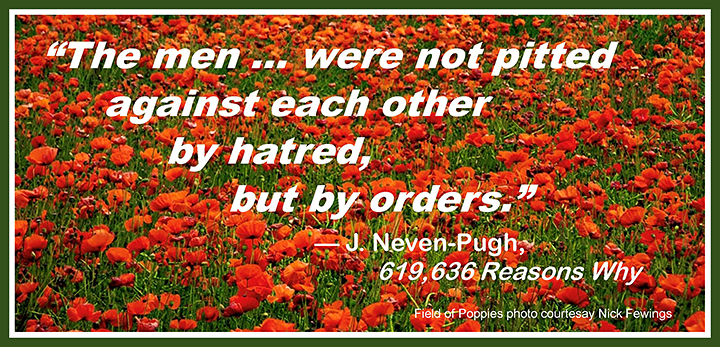
Hate need not be part of warCOFFEE WITH WARREN, with Warren Harbeck |

|
Lisa enquires about the box above her grandfather’s fireplace. Grandfather says it contains military mementos from her great-grandfather’s time in World War I. He also recounts how the box, which had belonged to a comrade of her great-grandfather’s, came into his possession. Lisa is intrigued by a silver crucifix among its contents. Grandfather says that the soldier who recovered the box from the battle field, a German, added it. Stunned, she asks: How can this be? They were our enemy! “War ... has never been black and white, Lisa, especially back then,” Grandfather says. “The men represented in that box were not pitted against each other by hatred, but by orders.” The story appears in 619,636 Reasons Why, Cochrane author J. Neven-Pugh’s 2014 anthology of prose and poetry, so named for the number of Canadian casualties in World War I, “The Great War.” On this Remembrance Day, Neven-Pugh’s story brings to mind an episode in my own family during the Second World War. My much-older brother Richard was an American airman flying out of Bury Saint Edmunds, England, in 1943. A radio gunner, he was on a raid over Belgium when the B-17G in which he was flying was hit. The abandon order was given to the ten-man crew. Richard and one other had no sooner bailed out than the plane exploded, taking the rest of the crew with it. Just as he was about to touch ground, Richard's parachute got hung up in a tree, leaving him dangling and very vulnerable to the rifle-bearing Nazi soldier standing near the foot of the tree. Fortunately, Richard could speak German and talked his opposite into tossing him up a knife so he could cut himself free. The German soldier lent a compassionate hand, then told him he had to do what he had to do, and took him prisoner and started him on his journey to Stalag Luft 3 and the nightmares that never left the rest of his life. At Stalag Luft 3, Richard was well aware that he was truly fortunate even to be alive. He soon assumed the role of teacher among his fellow POWs, conducting classes in math, English and Scripture. Indeed, after the war ended, he came home to the States to complete his university education and then returned to Germany to teach there for a few years, never forgetting the fact that when his parachute got caught up in a tree, the German soldier on the ground chose not to use him as the object of hateful target practice. He only did what he was ordered to do: march my brother off as a POW. In the years following his time of teaching in Germany, he returned to the States, taught there for a while, became a prominent author of science text books, and eventually assumed an administrative role in Washington, DC, a role that gained him a new friend he’d much admired, Wernher von Braun. Von Braun was the German wartime developer of the devastating V2 rocket. At the end of the war he was secretly brought to the United States, where he became part of the NASA team and a key player in developing the Saturn V launching system that propelled the States to the moon. And this is where my brother connected with him. Von Braun invited Richard as his personal guest to Cape Canaveral for one of the launchings. Yes, as Neven-Pugh so keenly observed, as adversaries during the war, von Braun and my brother were not pitted against each other by hatred, but by orders. And when those orders no longer applied, their friendship soared to the moon. Yes, let’s hear it for rising above hatred!
© 2021 Warren Harbeck |